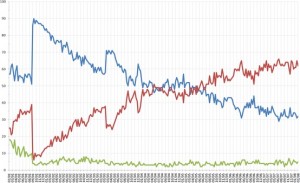Assumption…we all know the old saying about that. And as experts in our respective businesses fields, we often think we know why people behave the way they do. But as professional research unfolds and brings the hidden facts to the light of day, more often that not, people find that their assumptions are incorrect or at least skewed.
Recently IQS Research worked with the 55,000 Degrees initiative in Louisville to find out why people who had the capability to achieve a college degree ended up not attending or completing college.
The goal of this program was to increase the number of degree holding individuals in the Louisville area by 55,000, its primary challenge to discover why people don’t place a higher value on having a degree. One previously-held assumption was that people just don’t realize how important going to college is and that all that was needed was targeting marketing that stresses the financial benefit to obtaining a degree. That is, everyone thought they knew what the problem was, and leaped to a solution.
Our role in the project was to unearth the truth beneath this query and shatter any assumptions in order to bring about change and to get people into and back into school…and more to the point, to finish.
PROVEN: Post-Secondary Education Degrees Boost Earnings
There has been a lot of research into the topic of how cities, people, and families benefit by having degreed citizens in their communities. On average, a person with a college degree will earn more than one million more dollars over the course of his or her working years than a non-degreed individual — incentive enough, you might think.
But then if we pull the camera lens back and look at the larger economy, cities and communities also benefit because having a larger pool of degreed candidates in an area is a big draw to business and technology because they will have a substantial number of potential employees right at their back door.
And of course, as a general axiom, the more business and industry in a city, the better off it is economically, which then trickles down to individual quality of life and standard of living.
But Is That Incentive?
We surveyed 1000 adults and 300 kids grades 7-12 in the greater Louisville area to delineate their experiences and understand their perceptions about obstacles regarding going to college. And of course, as is so often the case, many of the assumptions were contradicted. Knowing they could earn more money was not the motivating factor to get people to go for more education after high school.
What we found out was that people overall very much appreciated and and understood the importance of going to college and even planned for it. But as is the case with so many goals, life happened.
Each of the 1,000 adults we surveyed all had their own reasons for not going to or finishing college. They were afraid they wouldn’t be accepted. They were anxious about their capacity and ability to succeed at college. It cost too much. They couldn’t keep up with the workload. They couldn’t balance school with family and a job. Or they had children. There were many, many different reasons why people didn’t go for post-secondary education.
And in nearly every case, not knowing they could earn more money was not the case.
The upside of this is, the 55,000 Degrees initiative was able to strategize appropriately, avoid wasting their time on the wrong strategies based on the wrong assumptions, and work clearly toward the goal of getting 55,000 more Louisvillians to attend some kind of school after they finished high school.







